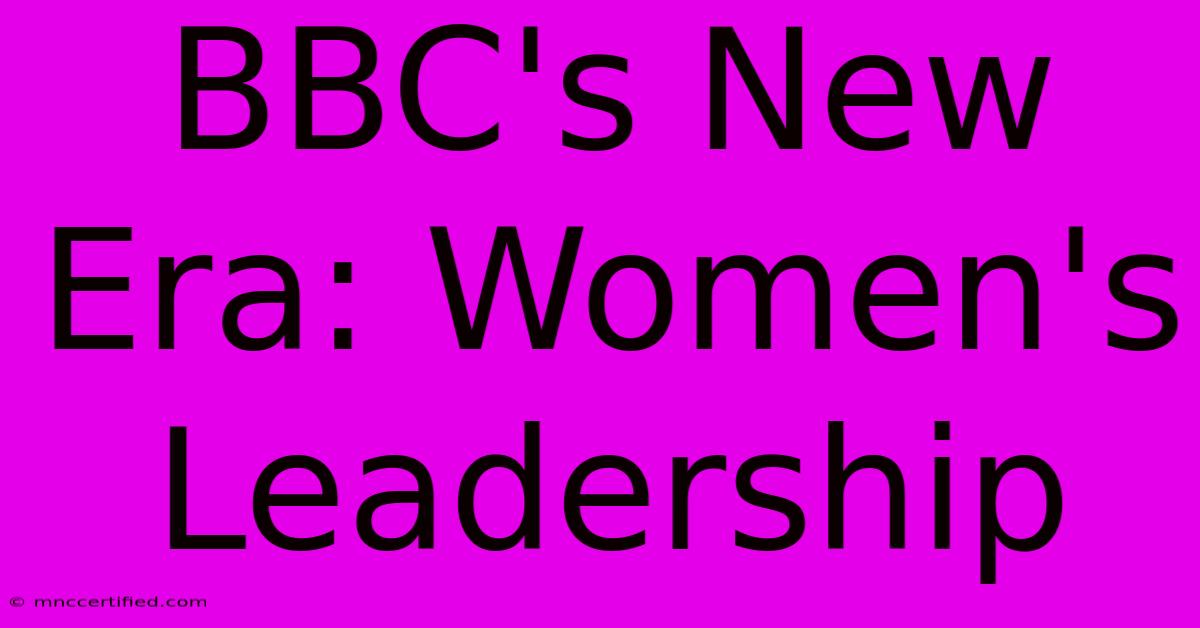BBC's New Era: Women's Leadership

Table of Contents
BBC's New Era: Women's Leadership and the Shifting Sands of Broadcasting
The BBC, a broadcasting behemoth with a global reach, is undergoing a significant transformation. While its commitment to quality journalism remains steadfast, a crucial element of this evolution is the rise of women in leadership positions. This shift isn't merely a matter of representation; it's a fundamental change reflecting evolving societal values and a recognition of the diverse talents within the organization. This article explores the impact of this new era of women's leadership at the BBC, examining its challenges, successes, and implications for the future of broadcasting.
The Rise of Women: Breaking the Glass Ceiling
For decades, the media landscape, including the BBC, has been dominated by men. While talented women contributed significantly, they often faced obstacles in ascending to senior roles. However, recent years have witnessed a notable shift. We've seen a growing number of women appointed to key positions, from news anchors and program directors to executive leadership roles. This progress, though significant, is not without its complexities.
Challenges Faced by Women Leaders at the BBC
The path to leadership for women at the BBC, while improving, remains challenging. These challenges include:
- The Gender Pay Gap: Despite strides made, the BBC has historically struggled with pay discrepancies between male and female employees. While efforts are underway to address this, achieving true parity remains an ongoing process.
- Implicit Bias: Unconscious biases can subtly affect hiring, promotion, and leadership opportunities. Addressing these biases requires a concerted effort through diversity training and fostering inclusive workplace cultures.
- Work-Life Balance: The demanding nature of broadcasting often makes it challenging to balance professional ambitions with personal life, disproportionately affecting women who frequently bear the brunt of childcare and family responsibilities. Flexible working arrangements and supportive policies are crucial in mitigating this.
- The "Queen Bee" Syndrome: This phenomenon, where women in senior positions unintentionally hinder the advancement of other women, is a concern that needs proactive measures to prevent.
Success Stories and Positive Impacts
Despite the challenges, the rise of women in BBC leadership has yielded numerous positive outcomes:
- Diverse Perspectives: A more diverse leadership team brings a wider range of viewpoints and experiences to programming and decision-making, leading to more inclusive and representative content.
- Improved Audience Engagement: Research suggests that audiences respond positively to seeing women in prominent leadership roles, potentially increasing viewership and engagement.
- Enhanced Reputation: The BBC's commitment to gender equality enhances its reputation as a progressive and responsible organization, attracting and retaining top talent.
- Mentorship and Sponsorship: Successful women leaders are vital in mentoring and sponsoring other women, creating a pipeline of future leaders.
The Future of Women's Leadership at the BBC
The journey towards gender equality at the BBC is far from over. Sustained effort is required to ensure that the current positive momentum continues. This includes:
- Transparent and Equitable Promotion Processes: Implementing robust, transparent systems that actively mitigate bias in recruitment and promotion is crucial.
- Investment in Diversity and Inclusion Initiatives: Continued investment in training programs and initiatives that foster a more inclusive workplace culture is essential.
- Flexible Work Arrangements: Supporting flexible work arrangements and family-friendly policies will help attract and retain talented women.
- Accountability and Measurement: Regularly measuring progress against key metrics, such as gender pay gaps and representation at different levels, will ensure accountability and drive further change.
The BBC's commitment to fostering women's leadership is not simply a matter of ticking boxes; it's a strategic investment in the future of the organization and the broadcasting industry as a whole. By addressing the challenges and building upon its successes, the BBC can solidify its position as a leader in promoting gender equality and creating a truly representative and inclusive media landscape. This is a story that is still unfolding, and its impact will be felt far beyond the hallowed halls of Broadcasting House.

Thank you for visiting our website wich cover about BBC's New Era: Women's Leadership. We hope the information provided has been useful to you. Feel free to contact us if you have any questions or need further assistance. See you next time and dont miss to bookmark.
Featured Posts
-
Disney And Bbc Studios First Joint Venture
Dec 19, 2024
-
Scotlands First Body Double Jailed
Dec 19, 2024
-
Trinity Rodman On Dennis Rodman
Dec 19, 2024
-
Eddie Stobart Founder Passes Away
Dec 19, 2024
-
Next Series Dent For Wallace
Dec 19, 2024